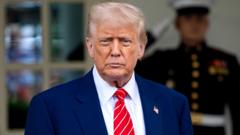
White House Considers Suspending Right to Challenge Detention
Washington, D.C. – The White House is reportedly exploring the possibility of suspending the legal right to challenge detention, a move that could have profound implications for civil liberties and the rule of law in the United States. Sources familiar with the discussions indicate that the administration is "actively looking at" options to limit or eliminate habeas corpus, the fundamental right that allows individuals to seek relief from unlawful imprisonment.
Habeas Corpus: A Cornerstone of Legal Protection
Habeas corpus, Latin for "you shall have the body," is a legal writ that requires a person under detention to be brought before a court to determine if their imprisonment is lawful. It is considered a cornerstone of legal protection against arbitrary detention and has a long history dating back to English common law. The U.S. Constitution explicitly protects the right to habeas corpus, although it allows for its suspension "when in Cases of Rebellion or Invasion the public Safety may require it."
Potential Justifications and Legal Arguments
While the specific circumstances that would justify such a drastic measure remain unclear, potential justifications could revolve around national security concerns, particularly in relation to terrorism or other perceived threats. Proponents of suspending habeas corpus might argue that it is necessary to detain individuals who pose a danger to the public without revealing sensitive intelligence information in court proceedings. They might also contend that existing legal frameworks are inadequate to address the challenges posed by modern threats.
However, any attempt to suspend habeas corpus is likely to face significant legal challenges. The Supreme Court has historically been reluctant to allow broad restrictions on this fundamental right. Critics argue that suspending habeas corpus would set a dangerous precedent, potentially leading to abuses of power and the erosion of due process protections. They also point out that existing laws already provide mechanisms for detaining individuals deemed to be a threat to national security, subject to appropriate judicial oversight.
Concerns from Civil Liberties Groups
Civil liberties groups have expressed deep concern about the prospect of suspending habeas corpus. These organizations argue that such a move would be a grave violation of fundamental human rights and would undermine the principles of justice and fairness. They warn that it could lead to the indefinite detention of individuals without due process, and that it would disproportionately affect marginalized communities.
- The American Civil Liberties Union (ACLU) has stated that it would vigorously oppose any attempt to suspend habeas corpus.
- Human Rights Watch has called on the administration to respect international human rights law, which prohibits arbitrary detention.
- Numerous other organizations have voiced similar concerns, highlighting the potential for abuse and the erosion of democratic values.
Historical Precedents and Comparisons
The U.S. has a limited history of suspending habeas corpus. President Abraham Lincoln famously suspended the writ during the Civil War, primarily in areas where there was active rebellion. This decision was controversial at the time and remains a subject of debate among historians. More recently, the debate over habeas corpus arose in the context of the detention of suspected terrorists at Guantanamo Bay. In Boumediene v. Bush (2008), the Supreme Court ruled that detainees at Guantanamo Bay had the right to habeas corpus review.
Possible Implications and Future Steps
The administration's consideration of suspending habeas corpus raises a number of important questions. What specific circumstances would trigger such a suspension? What safeguards would be in place to prevent abuse? How would the rights of detainees be protected? These are critical issues that need to be addressed if the administration proceeds with this plan.
It is expected that any attempt to suspend habeas corpus would face intense scrutiny from Congress, the courts, and the public. It is also likely to spark a heated debate about the balance between national security and civil liberties. The outcome of this debate will have a lasting impact on the future of American justice.
Key Considerations
- The potential for abuse of power.
- The erosion of due process protections.
- The impact on marginalized communities.
- The long-term consequences for American democracy.
- The need for transparency and accountability.
The situation remains fluid, and it is unclear whether the administration will ultimately decide to pursue this course of action. However, the very fact that it is being considered underscores the ongoing tensions between national security concerns and the protection of fundamental rights.
